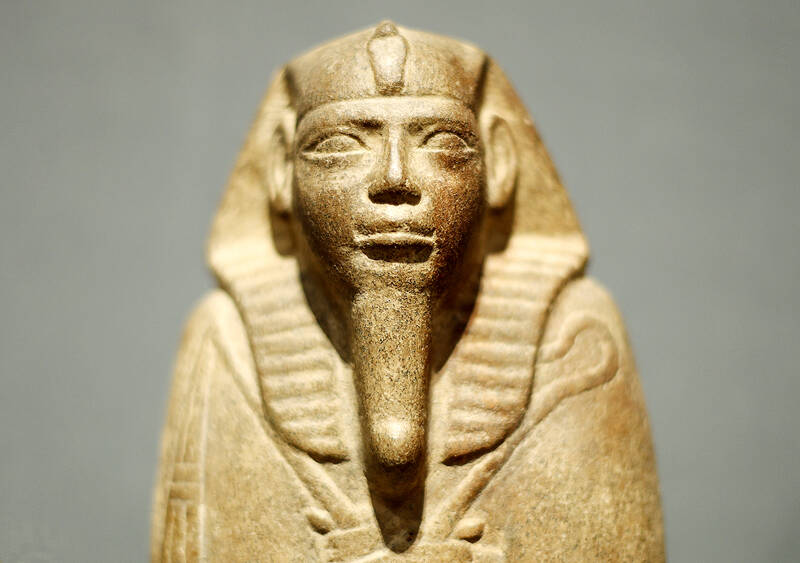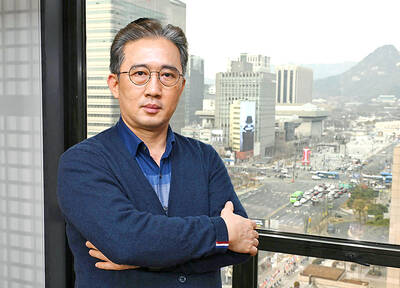Sudan’s cultural heritage stretches back thousands of years. The North African nation boasts ancient Nubian temples, more pyramids than Egypt and is credited with being the birthplace of modern pottery and metalwork techniques. Now, Sudanese archeologists, curators, academics and volunteers are braving fierce fighting to protect it.
Hundreds of people have been killed and thousands more injured since April 15, when the leadership of the Sudanese army and a paramilitary group with origins in the Darfur region failed to reach an agreement on how to merge their forces under a power-sharing deal that was supposed to lead to democratic elections.
As the conflict has spread, fighters have looted and set fire to museums and invaluable university archives.

Photo: EPA-EFE
Under the oversight of Heritage for Peace, an organization dedicated to preserving cultural heritage during wartime, dozens of volunteers and professionals have been preparing museum evacuation plans and documenting damage to precious sites across Sudan.
Despite challenges arranging safety measures and cash payments, the group has managed to station guards near archeological areas and museums outside the capital, Khartoum.
“We are trying to find a way to report regularly and support work on the ground,” said Tomomi Fuahiya, an assistant professor at the University of Warsaw’s Polish Centre of Mediterranean Archeology.
With Ismail Hamid Elnour, a member of the University of Birmingham’s Sudan Heritage Protection Initiative, Fuahiya is assisting Heritage for Peace, which previously worked to save artifacts from the Islamic State in Syria.
As fighting continues, the group is particularly concerned about the safety of the Egyptian temple of Buhen in the very north of the country, as well as the tomb of Muhammad Ahmad, commonly known as the Mahdi, who fought British colonial rule in the second half of the 19th century and went on to establish an Islamic state within Sudan.
Pressure to intervene on behalf of the country’s cultural heritage has mounted since video footage emerged showing fighters from the Rapid Support Forces (RSF) paramilitary entering the bioarchaeology lab of Khartoum’s National Museum and opening containers storing ancient human remains.
Satellite imagery obtained by the Cultural Heritage Monitoring Lab, made up of a coalition of experts from several US universities, also said that buildings belonging to the National Museum have been damaged by fire.
In Omdurman, the country’s most populous city, Elnour said that archives containing thousands of documents were looted and destroyed in a fire at Omdurman Ahlia University, which houses the Muhammad Omar Bashir Centre for Sudanese Studies and has long been celebrated as a hub of independent intellectual activity.
While volunteers have struggled to enter most of the Sudanese capital’s 13 museums since the conflict erupted, Elnour said that “the archeological sites and museums outside Khartoum are still protected by local archaeologists, guards and local communities.”
In a stroke of good fortune, the main National Museum building was under renovation when the war began, so most items had been packed away and placed in storage, Fuahiya said.
Of particular concern are a collection of 3,000-year-old Nubian monuments and temples now in the garden of the museum. An international effort to assemble and preserve these structures in the 1960s led to the creation of the modern UNESCO World Heritage system.
Archeological sites and pyramids at Meroe, the ancient walled city northeast of Khartoum where the conflict began, are also still intact.
However, the status of the Sheikan Museum in El-Obeid and the Darfur Museum in Nyala is unknown. Both museums are near the sites of some of the most intense fighting.
US and Saudi-mediated talks between the Sudanese Army and the RSF broke down in Jeddah just more than a week ago, and the two sides have not yet reconvened.
Heritage for Peace, which provided mediators with recommendations during the talks, has appealed to both parties to protect Sudan’s heritage, prevent illicit exports of cultural property and to stop illegal digging at archeological sites.
When reached for comment, an RSF spokesperson said their forces were “well aware of the significance” of the country’s artifacts and the importance of safeguarding them.
Addressing the incident at the National Museum, the spokesperson said the video was filmed by a member of the RSF who believed he was doing the right thing by documenting the boxes to provide proof that everything was intact.
“We have spoken with the individual concerned and strict instructions have been issued to all RSF personnel on site to ensure that their duties are fulfilled in a responsible manner,” the representative said.
A spokesperson for the army did not respond to questions.

VAGUE: The criteria of the amnesty remain unclear, but it would cover political violence from 1999 to today, and those convicted of murder or drug trafficking would not qualify Venezuelan Acting President Delcy Rodriguez on Friday announced an amnesty bill that could lead to the release of hundreds of prisoners, including opposition leaders, journalists and human rights activists detained for political reasons. The measure had long been sought by the US-backed opposition. It is the latest concession Rodriguez has made since taking the reins of the country on Jan. 3 after the brazen seizure of then-Venezuelan president Nicolas Maduro. Rodriguez told a gathering of justices, magistrates, ministers, military brass and other government leaders that the ruling party-controlled Venezuelan National Assembly would take up the bill with urgency. Rodriguez also announced the shutdown

Chinese President Xi Jinping’s (習近平) purge of his most senior general is driven by his effort to both secure “total control” of his military and root out corruption, US Ambassador to China David Perdue said told Bloomberg Television yesterday. The probe into Zhang Youxia (張又俠), Xi’s second-in-command, announced over the weekend, is a “major development,” Perdue said, citing the family connections the vice chair of China’s apex military commission has with Xi. Chinese authorities said Zhang was being investigated for suspected serious discipline and law violations, without disclosing further details. “I take him at his word that there’s a corruption effort under

China executed 11 people linked to Myanmar criminal gangs, including “key members” of telecom scam operations, state media reported yesterday, as Beijing toughens its response to the sprawling, transnational industry. Fraud compounds where scammers lure Internet users into fake romantic relationships and cryptocurrency investments have flourished across Southeast Asia, including in Myanmar. Initially largely targeting Chinese speakers, the criminal groups behind the compounds have expanded operations into multiple languages to steal from victims around the world. Those conducting the scams are sometimes willing con artists, and other times trafficked foreign nationals forced to work. In the past few years, Beijing has stepped up cooperation

The dramatic US operation that deposed Venezuelan president Nicolas Maduro this month might have left North Korean leader Kim Jong-un feeling he was also vulnerable to “decapitation,” a former Pyongyang envoy to Havana said. Lee Il-kyu — who served as Pyongyang’s political counselor in Cuba from 2019 until 2023 — said that Washington’s lightning extraction in Caracas was a worst-case scenario for his former boss. “Kim must have felt that a so-called decapitation operation is actually possible,” said Lee, who now works for a state-backed think tank in Seoul. North Korea’s leadership has long accused Washington of seeking to remove it from power